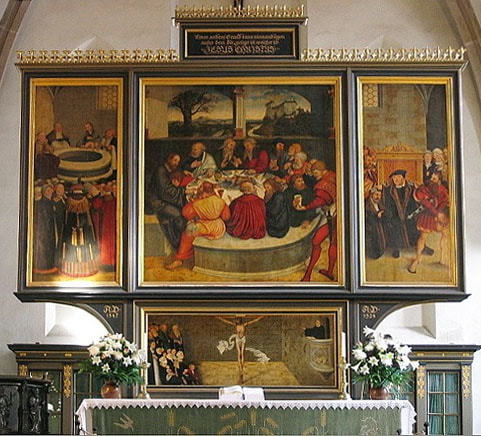Romans 10:5-17 and Mark 16:14-20
February 24, 2021
Scripture makes clear that no one will be justified by works of the law, because the law gives knowledge of sin (Romans 3:20). Rather, it is through the Gospel that we are justified before God and saved from eternal death. The Gospel is the good news that Jesus Christ, God’s own Son and the child of Mary, fulfilled God’s Law for us and was crucified for our sins. Christ’s death has taken away our sins and punishment. Jesus’ resurrection from the dead proves that we are indeed at peace with God! It is through faith in this wonderful message of God’s grace and forgiveness for Christ’s sake that we are saved. This is why the declaration is true, “Whoever calls on the name of the LORD will be saved.” Yet, the Apostle rightly points out: “How can they call on him in whom they have not believed? And how can they believe in him whom they have not heard? And how can they hear unless someone preaches to them? And how are they to preach unless they are sent?”
And so, the primary means to deliver the Gospel, so that sinners may believe it and be saved, is the preaching of the Gospel. Salvation comes through faith. Faith comes through hearing. Hearing comes through the preaching of Christ. In fact, even the word Gospel means Good Message. So, in order for sinners to be saved from their sin and eternal damnation, they must hear the preaching of the Gospel! C. F. W. Walther, our synod’s first president, compared the preaching of the Gospel to messengers of a king delivering a message of pardon to rebels. The rebels are doomed to destruction, but the king out of compassion for his people, forgives them in his heart and sends out his ambassadors to proclaim the good news of pardon to the rebels in fear of punishment. Yet, they need to hear the message, or they will not believe it or live as pardoned citizens.
St. Paul says that he is not ashamed of the Gospel, because it is the power of salvation to all who believe. And indeed, the Gospel is powerful to save, because all who believe it are saved. Yet, the power of the Gospel is not only in its power to forgive, but in its power to be believed. The Gospel not only declares pardon from God, but empowers the sinful heart to believe and be saved. The Holy Spirit works through the Gospel to produce faith, by enlivening hearts, and awakening them from death. The Lord spoke through the Prophet Isaiah:
“For as the rain and the snow come down from heaven
and do not return there but water the earth,
making it bring forth and sprout,
giving seed to the sower and bread to the eater,
11 so shall my word be that goes out from my mouth;
it shall not return to me empty,
but it shall accomplish that which I purpose,
and shall succeed in the thing for which I sent it.” (Isaiah 55:10-11)
This is the power of the Gospel: the power to save and the power to be believed.
For this reason, the Gospel is our most precious treasure. The most important task a minister has is to preach the Gospel, as St. Paul says, “Woe to me if I do not preach the Gospel!” (1 Corinthians 9:16) And the most important thing a Christian does is hear the Gospel, because only through hearing it can you be saved. Scripture says, “Man shall not live by bread alone, but by every word that comes from the mouth of God.” (Matthew 4:4; Deuteronomy 8:3) No one should underestimate the importance and urgency of hearing God’s word preached. It is our life and source of eternal sustenance.
The Gospel is worth suffering and dying for. It’s well known that all the apostles except for John were killed for preaching the Gospel. And John himself suffered greatly on account of the Gospel. And it has always been preached from the beginning that Christians should be ready to suffer the loss of everything for the sake of the Gospel, as Jesus himself said, “What profit is it if a man gains the whole world, but forfeits his soul?”
Recently, I read Robert Louis Stevenson’s novel, Treasure Island to my kids. I don’t want to ruin the book for those of you who have not read it, but I think most of you know the basic plot. There is an island with treasure on it. The good guys get ahold of a map and go searching for the treasure. Yet, on their journey they discover that most of the crew are actually treacherous pirates planning a mutiny. The quest for the treasure ends up costing many casualties. At one point in the novel, the main character, Jim Hawkins, expresses his sorrow that so many lost their lives in pursuit of riches, indicating, that although they would become immensely rich by the treasure, it didn’t outweigh the cost of human life. Those were wise words Stevenson gave to the lad Hawkins, wiser words than most understand. Yet, the same cannot be said about the cost of the Gospel. The Gospel is worth every loss of possession, relationship, and body. There is nothing worth losing the Gospel over. And so, when we are wise and led by the Spirit, we seek to hear it and learn it.
The Gospel is not something we simply hear once and then have no need to hear it again. Although a person can certainly hear a single sermon, believe it, and be saved before he dies, that is not the way it normally works. Rather, as long as a Christian lives, he must continue to hear the Gospel. First, because God commands us not to despise his preaching and word, but to hold it sacred and gladly hear and learn it. To reject hearing the Word of God is a sin. Secondly, because we daily sin much and are attacked by the devil, so that we feel guilty and doubt. Through the preaching of the Gospel, we receive the forgiveness of all our sins and confidence in our salvation. No one is able by his own strength to believe in Jesus Christ, but must rely on the power of the Holy Spirit, who comes through the preaching of the Gospel. Thirdly, the Gospel delivers us Jesus, whom we love. Jesus says, “My sheep hear my voice, I know them, and they follow me. I give them eternal life. And no one will snatch them out of my hands.” We Christians hear the word of Christ, because we love Christ and desire to be with him and to hear his teaching. Fourthly, for the sake of our prayers. We are very needy people. Yet, we do not always know what to pray for as we ought nor do we always have the confidence to pray. Yet, through the preaching of the Gospel, we learn to be confident to pray to God as our dear Father, to expect forgiveness and grace from him, and to be confident to trust in his will. For the sake of our prayers, we should gladly and regularly hear and learn the Gospel.
Finally, it is important for us to hear the preaching of the Gospel, so that we can learn from Jesus. There are many false teachers in the world and false gods that lure our heart away. There is no better teacher than Jesus. Jesus teaches us through the preaching of the Gospel based on Holy Scripture.
For these reasons, every Christian sermon should have three goals. First, to proclaim the Law, so that we recognize that we are sinners in need of a Savior and so that we repent of our sins. Second, to proclaim the Gospel, so that sinners know that they have a gracious God, who forgives them for Christ’s sake and gives them eternal salvation. It is faith in the Gospel message alone, which gives eternal life, which is why the Gospel must predominate in Christian preaching. The third goal of Christian preaching, is to teach, so that Christians are equipped to give a defense for their faith, grow closer to God, and be equipped for good works.
God is rich and liberal in his grace to preach the Gospel to us. Yet, do not misinterpret his generosity to mean that the Gospel is cheap. The Gospel is our most precious treasure, which gives to us eternal life. It is something we cannot do without, because we cannot do without Jesus. Amen.
Midweek Lenten Series: The Means of Grace
“We will now return to the Gospel, which not merely in one way gives us counsel and aid against sin; for God is superabundantly rich [and liberal] in His grace [and goodness]. First, through the spoken Word by which the forgiveness of sins is preached [He commands to be preached] in the whole world; which is the peculiar office of the Gospel. Secondly, through Baptism. Thirdly, through the holy Sacrament of the Altar. Fourthly, through the power of the keys, and also through the mutual conversation and consolation of brethren, Matt. 18:20: Where two or three are gathered together, etc.”
The article above is from the Smalcald Articles, written by Martin Luther at the request of Elector John Frederick in December of 1536 and presented at the meeting of the Smalcaldic League in February of 1537. The Smalcald Articles are part of our Lutheran Confessions in the Book of Concord. In this particular article Luther explains that the one Gospel is given to us in multiple ways. These multiple ways are called the Means of Grace. They are means by which God gives us his grace. So, there is one Gospel, which reveals God’s grace to us in Jesus Christ. Yet, there are many means by which God gives us this Gospel. And no matter by which means the Gospel is given, it is received through faith alone. This Midweek Lenten Series, we will explore how rich and liberal our God is in his grace by examining the Means of Grace.


 RSS Feed
RSS Feed